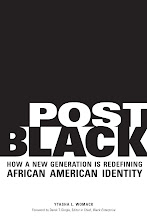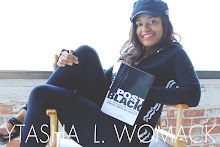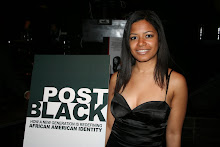Saturday, January 2, 2010
POST BLACK AUTHOR YTASHA L. WOMACK DISCUSSES HER NEW BOOK
Featured interview with Post Black author, Ytasha L. Womack. Interviewer: Chris Chaney of NV Magazine. Chaney is featured in Post Black as well.
CC: Post Black has been a term that has bounced around really since Obama has taken office. What does it mean to you?
YLW: Post Black embraces the diversity within the African American community and includes those communities and lifestyles that don't fit neatly into the “African American Identity Box.” This box includes a range of assumptions, beliefs and ways of life that all African Americans are assumed to ascribe to. So I start the book off really knocking all the assumptions as to what the book is about before I go deep into the subject matter.
In the book itself, I take a look at communities in the Gen X and Y world including professionals, artists, entrepreneurs, spiritualist, as well as identity issues involving young women, immigrants, biculturalism, the President, The Talented 10th concept and more.
CC: Why did you decide to write this book now? What about the America we now live in or the generation that we are a part of made this the time?
YLW: There have been incredible innovations in the past decade or so. Social constructs have changed and managing or embracing this diversity is forcing many people to reevaluate their beliefs. For some people this is a very fluid process and for others it is extremely difficult. It's actually a global occurrence. But there wasn't much of a context for the discussion within our community and I hoped that this book would provide one. I include conversations with family, friends and people of all walks of life. I include anecdotes. I also include some personal experiences because it's not fair to talk about African American identity and not talk about myself.
CC: You cover a lot of topics in your book that are all integral to this generation’s identity. What portion of the book do you see as the most significant? What interview responses to what topics were the most surprising?
YLW: I thought it was very profound that everyone I interviewed either consciously or subconsciously made life decisions based around the notion of African American or black identity. In many cases the careers and schools they chose, the interests they pursued, the decision to be an entrepreneur, their commitments to service, etc were all extensions of defining themselves culturally. All decisions were seen as either a reflection of, responsibility to, or some way of advancing African American culture. Even spiritual pursuits. That's major. So whether someone was a salsa musician or an African immigrant opening a restaurant, a minister, or a homeowner in a gentrified area, each felt this need to make decisions out of a larger sense of cultural awareness.
I was surprised when an African immigrant shared that she felt she was at a crossroads of sorts having to defend native born African Americans to other African immigrants and vice versa. She also said that for African Americans to know their history wasn't enough. We needed to take a DNA test to learn our African lineage. I found myself thinking about that. For the blog, I interviewed an immigrant who was raised in Europe and talked at length about how he was influenced greatly by African American culture and the civil rights struggle before he came to the U.S. I interviewed a woman who was told “you're from slave” when she was in Europe and introduced herself as African American. In some countries to identify yourself as African American causes confusion. No one knows what you're talking about. I interviewed black gay men who couldn't relate to gay identified culture. But I was also surprised to learn that many people who had religious practices and weren't traditional Christians initially felt very alone in their journey. This surprised me because the number of people who share these beliefs are significant.
CC: You covered some subjects that are taboo in everyday conversations, specifically religion and sexuality. Why do you think it was necessary to write about how African Americans see themselves in this area?
YLW: Probably some of the greatest change has taken place within the frameworks of how people view themselves both spiritually and sexually. They are both core subjects for this generation. To ignore them would be to ignore some of the leading changes within the African American social paradigm.
CC: With regards to religion you go into detail about your personal beliefs and you highlight those who have broken from religions traditional to African Americans to embrace Buddhism, Yoruba, etc. What effect did you want to have on the reader?
YLW: I'm hoping that the reader sees the diversity in the African American religious experience. There's a growing interest within America at large in both spirituality, Eastern religions, indigenous spiritual beliefs as well as both New Age and New Thought. African Americans are a central part of that experience. In many cases we provided a number of pioneers in those areas and the beliefs have been in the making for several generations in this country.
CC: There is a quote in your book where you are writing about misogyny in Hip Hop and this one young female college student you interviewed defends scantily clad women in a video by saying “Wearing no clothes is a part of our culture. People in Africa don’t wear clothes.” Did that really happen? And do you know where that young lady is now so she can be further educated?
YLW: That's a true story. I don't know where she is. But hopefully the conversation gave her something to think about. The video in question was Nelly's Tip Drill, which caused a protest amongst college women. The young lady couldn't explain why she liked music and videos with misogynistic themes. Many young women can't. But she got flustered trying to explain it all and defended it by saying it was a part of her heritage to do so.
It was appalling to say the least. But the odd thing was she was trying to understand misogyny or sexuality in the context of African American identity. It was an attempt to make some connection between her decisions to listen to sexualized, misogynistic music and her ancestry. Her connections were totally off, inaccurate, and ignorant. But even that decision was an attempt to link her life to some greater sense of African American identity. It goes to show how powerful and misguided notions of black identity can be. She couldn't just say I like the women in these videos or I like dressing that way and I feel guilty. She had to explain her guilt away by saying it was part of her distant lineage. Britney Spears can wear revealing outfits but I can't imagine anyone defending her right to do so as a part of her European ancestry.
CC: You spend time in your book discussing the new black populace and how they identify themselves with African Americans. What you reveal is a definite cultural gap. What do you think it will take to close that gap between Africans, Caribbeans and African Americans?
YLW: I don't think the gap is that wide. However, increased social interaction is the key. Frequenting cultural events and meeting people of other cultures so that other cultural groups aren't viewed as “other” is a necessary step. This is happening in many arenas. In some cases it has happened for years, but in places where it is not [happening], some initiative has to be taken. I also think it's important that there's a recognition that being black in America embodies a variety of cultural backgrounds. There should be more dialog and education on that issue. That recognition alone will forge more inclusiveness within groups and organizations who may not realize their limited definition of “black in America” is repelling various segments of the black community.
CC: When you take on the lofty goal of writing a book about a culture it definitely puts you in a position of being criticized. Immediately, people ask who are you to write this, especially African Americans. So how about you answer that now. What qualifies you to write this book?
YLW: I quote Robert Kennedy. If not me, who? If not now, when? Well, that applies to any burning idea someone has. And this limited concept of African American identity has disturbed me for some time. The issue of identity kept popping up in my work and life experiences. And I've devoted a great deal of time to trying to be me in the midst of many assumptions as to who I should be and how I should operate. I've written for numerous publications targeting African Americans. I've interviewed a span of black people on a range of interests and issues. And personally, I've been involved in a wide spectrum of black life from the arts to business to media. My perspective is a valid one.
One thing that became very clear as I explored these issues is that the notion of blackness wasn't created by black people alone. It's a definition we were boxed into and have been struggling to redefine ever since. Much of this effort to redefine took place in the midst of harsh and extreme resistance. However, with respect to identity, everyone has an invested view into whatever descriptions they use to identify themselves, whether that be racially, ethnically, sex, etc. In changing times, all of these labels come into question. What does it mean to be a man in 2010 is as complex a question as what does it mean to be African American, or Asian American, or bisexual or blonde.
CC: If there could be one ideal African American identity what components would it have and is there anyone who represents it past or present?
YLW: There is no ideal black identity . . . and that's a good thing. At the same time, I do think it's very important that people know the richness and diversity of culture, history and the role it plays on the world stage and in their own lives. I also think people should have a strong sense of responsibility to both educate and empower people around issues of culture and history. Moreover, cultivating a sense of purpose that includes a respect for humanity and a dedication to social good is important. But I would advise that to anyone.
Subscribe to:
Post Comments (Atom)




Thank you Ytasha for the privilege of interviewing your beautiful mind. I think Post Black will be the classic of our generation. You really capture the voices I have heard echoing in immaculate corporate offices, "we have moved on up" condo apartments, at must-be-seen fundraisers, upscale lounges and the streets of Harlem. They are all relevant to the new African American identity that you have so eloquently unveiled to the world. So thank you for your literary contribution. Thank you for your voice.
ReplyDeleteSounds interesting like an interesting book. I'll check out the meet and greet in Chicago this week.
ReplyDeleteTo me, there definitely seems to be an upsurge of the middle class/middle ground/middle of the road black people.
Maybe I am speaking from a younger perspective, but one thing that always seemed contradictory to me is the notion that knowing more about how life was in Africa/during slavery can still prepare blacks for their day to day challenges in America.
On the contrary, I feel like empowering ourselves with black culture helped to a point but has inadvertently held blacks back as time progressed. It goes without saying that it was beneficial to an extent, when there was a lack of dialogue or understanding in the black community and a lack of identity.
However, in my opinion, the emphasis on black culture started out as educational, it eventually took on ethnocentric undertones and created a binary opposition to things that were not ‘black.’ The irony of the whole situation is that we pushed so hard not to lose our identity of who we are/what we went through/where we came from, that we enveloped our past around us so tightly that we pigeonholed ourselves into a corner.
There is a divide created by the metanarrative of what it means to be black and what it means if you don’t follow neatly into the ideal. The question I find ask myself is how will black culture move forward as a culture if since its inception in America it has been is self-absorbed and focused primarily on the past? To me, the answer is quite simple…
It doesn’t...
That is why, to put it crudely, black people aren’t being ‘black’ anymore or in institutional terms, they are redefining what it means to be black. In the same sense that Nietzsche said ‘God is dead and we have killed him,” so too has the idea of black culture been put to bed for a growing number of black Americans. It has lost its effectiveness and people no longer buy into the metanarrative.
I guess I am just thinking out loud but I do see striking similarities between the emergence of the next generation blacks or the ‘nouvelle noir’ as I like to call them and the writings of Jean Francois Lyotard discussing the breakdown of the metanarrative in the postmodern world.
I do have a question for you however; I would like to know whether you think theoretically/hypothetically there will ever be a time where being African-American turn into Black-Americans/Americans? Not as an attempt to disassociate from our past or assimilate into white America, but as an acknowledgement that the color of our skin or country of origin no longer defines who we are or what we do as individuals? If we can denature what it means to be African-American, then what is the point of the label at all other than to illustrate a difference between your fellow man that is no longer discernible?
To use an example to try and get my point across a little better, I met a friend across the border when I lived in Canada. He was African-Canadian or whatever is politically correct up yonder, yet he always felt it necessary to claim his father's Jamaican heritage and speak with an embarrassingly fake Jamaican accent whenever he was around college students from the Caribbean. To him, the idea of being seen as Canadian obviously made him feel inferior or less black and so he compensated by ignoring his country of birth and reaching for a distant memory in hopes of acceptance. Perhaps now that blacks are accepted in America we do not need to refer to a country that has little bearing on how we currently live our lives in today’s world? Interested to hear your opinion…
Ytasha L. is a great writer. I love her books and they have taught me so many things. Strongly recommended for those wanting to read good contemporary literature.
ReplyDeleteThhis is a great blog
ReplyDelete